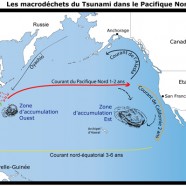Millions of Stowaway Passengers Circling Around the Pacific Ocean
The tsunami which followed the Japanese earthquake devastated around 300km of coastal cities, towns, farmlands and greenhouses along Japan’s Pacific coastline. The wave was reported to have spread up to 10km (six miles) inland and inundated around 500km². Not only did the earthquake and tsunami create an estimated 25 million tonnes of rubble, but when the tsunami receded it dragged with it countless quantities of waste in the flooded zone.
Millions of Stowaway Passengers Circling Around the Pacific Ocean
The tsunami which followed the Japanese earthquake devastated around 300km of coastal cities, towns, farmlands and greenhouses along Japan’s Pacific coastline. The wave was reported to have spread up to 10km (six miles) inland and inundated around 500km². Not only did the earthquake and tsunami create an estimated 25 million tonnes of rubble, but when the tsunami receded it dragged with it countless quantities of waste in the flooded zone.
Probo Koala To Bangladesh: Refused
Warned by Robin des Bois as early as May 17th 2011 of the Probo Koala’s imminent arrival to be beached for demolition (1), Bangladesh authorities, through its Ministry of Environment & Forest have just closed access to the demolition shipyard to this ship whose last known name was Gulf Jash, IMO number 8309816. This is the first time a ship destined to demolition is turned away from Bangladesh waters. The decision is justified by the history of this tanker and the particularly toxic residue still possibly on board. The list of these substances and a draft of the ship can be found here.
Probo Koala To Bangladesh: Refused
Warned by Robin des Bois as early as May 17th 2011 of the Probo Koala’s imminent arrival to be beached for demolition (1), Bangladesh authorities, through its Ministry of Environment & Forest have just closed access to the demolition shipyard to this ship whose last known name was Gulf Jash, IMO number 8309816. This is the first time a ship destined to demolition is turned away from Bangladesh waters. The decision is justified by the history of this tanker and the particularly toxic residue still possibly on board. The list of these substances and a draft of the ship can be found here.
Probo Koala To Bangladesh: Refused
Warned by Robin des Bois as early as May 17th 2011 of the Probo Koala’s imminent arrival to be beached for demolition (1), Bangladesh authorities, through its Ministry of Environment & Forest have just closed access to the demolition shipyard to this ship whose last known name was Gulf Jash, IMO number 8309816. This is the first time a ship destined to demolition is turned away from Bangladesh waters. The decision is justified by the history of this tanker and the particularly toxic residue still possibly on board. The list of these substances and a draft of the ship can be found here.










